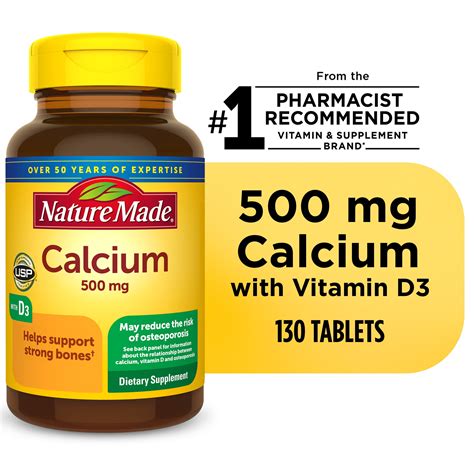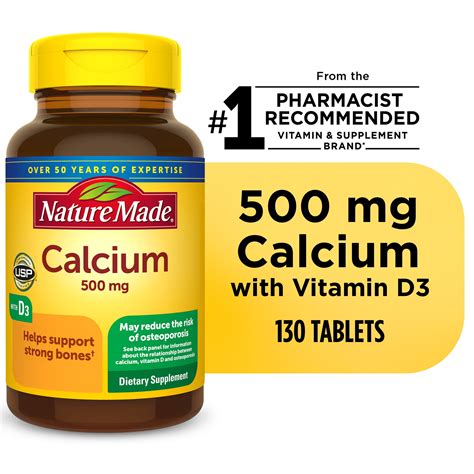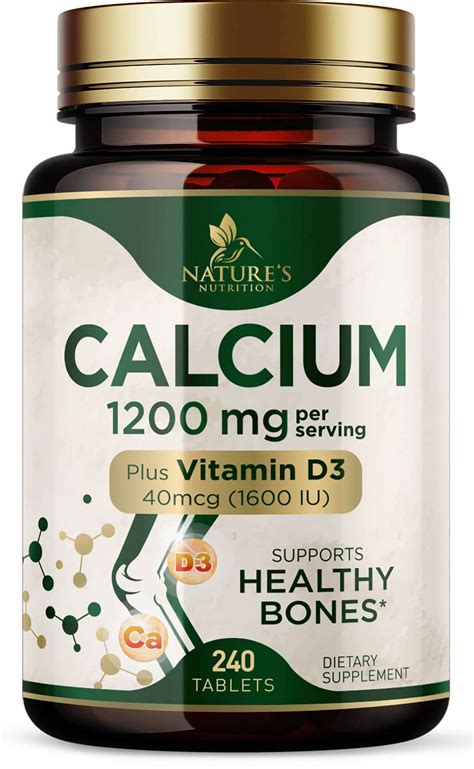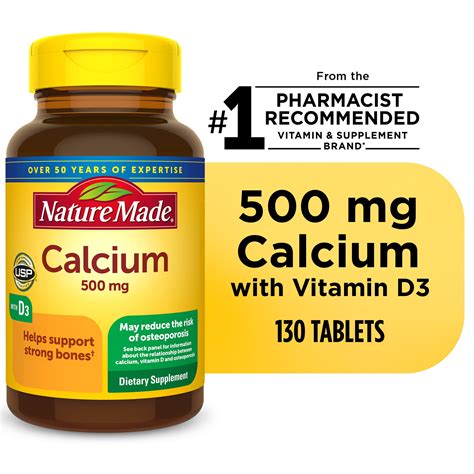Intro
Boost your bone health with calcium vitamin D supplements! Discover the 7 benefits of combining these essential nutrients, including improved bone density, reduced osteoporosis risk, and enhanced muscle function. Learn how calcium and vitamin D work together to support overall wellness, and find out who can benefit from these supplements.
Calcium and vitamin D are two essential nutrients that play a crucial role in maintaining strong bones and overall health. While it's possible to get these nutrients through a balanced diet, many people may not get enough from their food alone. This is where calcium vitamin D supplements come in. In this article, we'll explore the benefits of taking these supplements and why they're important for your health.

First, let's talk about the importance of calcium and vitamin D. Calcium is necessary for building and maintaining strong bones and teeth, while vitamin D helps the body absorb calcium. Without sufficient vitamin D, the body can't effectively absorb calcium, leading to weak and brittle bones. This can increase the risk of osteoporosis, a condition characterized by brittle and porous bones.
Benefits of Calcium Vitamin D Supplements
Taking calcium vitamin D supplements can provide numerous health benefits. Here are seven of the most significant advantages of taking these supplements:
1. Stronger Bones
Calcium and vitamin D supplements can help build and maintain strong bones. This is especially important for older adults, as bones naturally weaken with age. By taking these supplements, you can reduce the risk of osteoporosis and fractures. In fact, studies have shown that calcium and vitamin D supplements can reduce the risk of hip fractures by up to 30%.
2. Improved Bone Density
Taking calcium vitamin D supplements can also improve bone density. This is especially important for people who are at risk of osteoporosis, such as postmenopausal women. By increasing bone density, you can reduce the risk of fractures and osteoporosis-related complications.
3. Reduced Risk of Osteoporosis
As mentioned earlier, calcium and vitamin D supplements can reduce the risk of osteoporosis. This is especially important for people who are at risk of developing the condition, such as older adults and people with a family history of osteoporosis.
4. Improved Muscle Function
Calcium and vitamin D supplements can also improve muscle function. This is because calcium is necessary for muscle contractions, while vitamin D helps regulate muscle function. By taking these supplements, you can improve muscle strength and reduce the risk of muscle weakness.
5. Reduced Risk of Falls
Falls are a common problem among older adults, and can lead to serious injuries and complications. By taking calcium vitamin D supplements, you can reduce the risk of falls by improving muscle function and balance.
6. Improved Immune Function
Vitamin D has been shown to have immunomodulatory effects, meaning it can help regulate the immune system. By taking calcium vitamin D supplements, you can improve immune function and reduce the risk of illnesses.
7. Reduced Risk of Chronic Diseases
Finally, calcium and vitamin D supplements have been shown to reduce the risk of chronic diseases, such as heart disease and diabetes. This is because calcium and vitamin D help regulate blood pressure and blood sugar levels, reducing the risk of these conditions.

Who Should Take Calcium Vitamin D Supplements?
While anyone can benefit from taking calcium vitamin D supplements, some people may need them more than others. Here are some groups that may benefit from taking these supplements:
- Older adults: As bones naturally weaken with age, older adults may benefit from taking calcium vitamin D supplements to reduce the risk of osteoporosis and fractures.
- Postmenopausal women: Postmenopausal women are at risk of osteoporosis due to hormonal changes. Taking calcium vitamin D supplements can help reduce this risk.
- People with a family history of osteoporosis: If you have a family history of osteoporosis, you may be at risk of developing the condition. Taking calcium vitamin D supplements can help reduce this risk.
- People with limited sun exposure: Vitamin D is obtained through sun exposure, so people who have limited sun exposure may need to take supplements to get enough vitamin D.
How to Choose the Right Calcium Vitamin D Supplements
If you're considering taking calcium vitamin D supplements, it's essential to choose the right ones. Here are some tips to help you make the right choice:
- Look for supplements that contain calcium citrate or calcium carbonate, as these are easily absorbed by the body.
- Choose supplements that contain vitamin D3, as this is the most effective form of vitamin D.
- Consider taking supplements that contain other nutrients, such as magnesium and vitamin K, which can help improve bone health.
- Always consult with a healthcare professional before taking any supplements to ensure you're getting the right amount and type of nutrients for your needs.

Conclusion
Calcium vitamin D supplements can provide numerous health benefits, from stronger bones to improved immune function. By taking these supplements, you can reduce the risk of osteoporosis, fractures, and chronic diseases. If you're considering taking calcium vitamin D supplements, make sure to choose the right ones and consult with a healthcare professional to ensure you're getting the right amount and type of nutrients for your needs.

We hope this article has provided you with valuable information about the benefits of calcium vitamin D supplements. If you have any questions or comments, please feel free to share them below.
What is the recommended daily intake of calcium and vitamin D?
+The recommended daily intake of calcium and vitamin D varies by age and sex. Generally, adults need 1,000-1,200 mg of calcium and 600-800 IU of vitamin D per day.
Can I get enough calcium and vitamin D from food alone?
+While it's possible to get some calcium and vitamin D from food, it's often difficult to get enough from diet alone. Foods rich in calcium include dairy products, leafy greens, and fortified plant-based milk, while vitamin D is found in fatty fish, egg yolks, and fortified foods.
Are calcium vitamin D supplements safe?
+Generally, calcium vitamin D supplements are safe when taken in recommended amounts. However, excessive intake can lead to side effects such as kidney stones, nausea, and vomiting. Always consult with a healthcare professional before taking any supplements.
